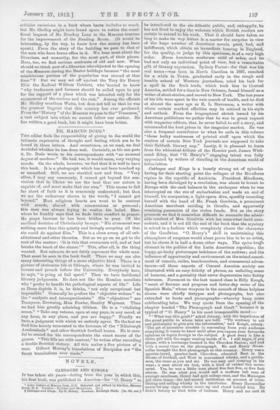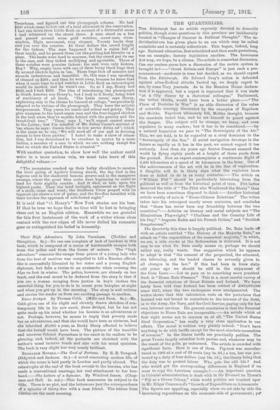NOVELS.
CABBAGES AND KINGS.t IT has taken six years—dating from the year in which this, his first book, was published in America.—for "0. Henry" to
• Later ',Atm., of Matrons Dods, D. D. Selected and edited by his Son, Marcus Dods, M.A. London : Hodder and Stoughton, [6e.] Ciallasss alit Hinge. By 0. Hem7, London: Xveleigh Nash. [Is, ad. not.]
be introduced to the ois-Atlantie public, and, unhappily, he has not lived to enjoy the welcome which British readers are certain to extend to his work. That it should have taken so long to make its way hither is a mat ter for surprise in view of the huge number of American novels, good, bad, and indifferent, which obtain an immediate hearing in England, for the quality, to judge by this specimen, is of a very high, order. Mores hotainant multorum vidit sf urbes, and he had not only an individual, point of view, but a remarkable gift of literary expression. Sydney Porter—for that was his real name—was born in North Carolina in 1867, ranched for a while in Texas, graduated early in the rough and
tumble school of Western journalism, tried his luck for a spell in the fruit trade, which took him to Central America, settled fora time in New Orleans, found himself as a writer of short stories, and moved to New York. The last years of hie life were spent in the vain search of health, and he died at almost the same age as R. L. Stevenson, a writer with whom certain marked affinities may be noticed in his style and outlook. From the biographical sketch issued by his American publishers we gather that he was in great request with magazine editors, that he never failed to sell a. story, and commanded the best prices in the magazine market. He was also a frequent contributor to what he calls in this volume
"those bulky mattresses of printed stuff upon which the readers of certain New York journals are supposed to take their Sabbath literary nap." Lastly, it is pleasant to learn from the whimsical tribute of the Hoosier poet, James Whit- comb Riley, that "0. Henry's" engaging talent was fully appreciated by writers of standing in the American world of
belles-lettres.
Cabbages and Sings is a loosely strung set of episodes having for their starting point the collapse of the Miraflores regime in the republic' of Anchuria. President Miraflores, having been dislodged by a revolution, was about to levant to
Europe with the cash balance in the exchequer when he was intercepted on the eve of embarkation and made an end of himself, his companion, a light-opera diva, speedily consoling
herself with the hand of Mr. Frank Goodwin, a prominent
American merchant residing in Covello, and apparently retaining possession of the stolen funds. But as the story proceeds we find it somewhat difficult to reconcile the admir- able conduct of Mrs. Goodwin with her somewhat lurid ante- cedents, and it is not till the end of the book that the mystery is solved in a fashion which completely clears the character of the Goodwius. "0. Henry's" skill in maintaining this atmosphere of suspense would alone prove him to be an artist, but he shows it in half a dozen other ways. The opera bouire element in the politics of the Latin American republics; the happy-go-lucky picturesque indolence of the natives; and the influence of opportunity and environment on the mixed assort- ment of consuls, exiles, beachcombers, and commercial adven- turers—all these aspects of Central America society are illustrated with an easy felicity of phrase, an unfailing sense of humour, and a geniality that never degenerates into flabby tolerance. Foremost in the last named class is Billy Keogh, "scout of fortune and progress and latter-day rover of the Spanish Main," whose weapons in the assault of these helpless shores were chiefly tintypes and photographs, but also extended to boots and phonographs—whereby hang some exhilarating tales. We may quote from the opening of the chapter headed "The Phonograph and Graft" because it is typical of "0. Henry" in his most irresponsible mood :—
". What was this graft?' asked Johnny, with the impatience of the groat public to whom tales are told. "Pis contrary to art and philosophy to give you the information,' said Keogh, calmly. 'The art of narrative consists in concealing from your audience everything it wants to know until after you expose your favourite opinions on topics foreign to the subject. A. good story is like a bitter pill with the sugar coating inside of it. I will begin, if you please, with a horoscope located in the Cherokee Nation; and end with a moral tune on the phonograph. Me and Henry Horse- collar brought the first phonograph to this country. Henry was a, quarter-brood, quarter-back Cherokee, educated East in the idioms of football, and West in contraband whisky, and a gentle- man, the same as you and me. He was easy and romping in his ways ; a man about six foot, with a kind of rubber tiro move- ment. Yes, he was a little man about five foot five, or fivo foot eleven. He was what you would call a medium tall man of average smallness. Henry had quit college once, and the Muse.ogee jail three timos—tho last-named institution on account of intro- ducing and selling whisky in the territories. Henry Horseeollar never let any cigar stores come up and stand behind him. He didn't belong to that tribe of Indians. Henry and me met at
Texarkana, and figured. out this phonograph scheme. He had $300 which came to him out of a, land allotment in the reservation. I had run down from Little Rook on account of a distressful scene I had witnessed on the street there. A man stood on a box and passed around some gold watches, screw case, stem- winders, Elgin movement, very elegant. Twenty bucks they cost you over the counter. At three dollars the crowd fought for the tickers. The man happened to find a valise full of them handy, and he passed them out like putting hot biscuits on a plate. The backs were bard to unscrew, but the crowd put its ear to the case, and they ticked mollifying and agreeable. Three of those watches were genuine tickers the rest were only kickers. Hey P Why, empty cases with one of them horny black bugs that fly around electric lights in 'em. Them bugs kick off minutes and seconds industrious and beautiful. So, this man I was speaking of cleaned up $288; and then ho went away, because he knew that when it (lame time to wind watches in Little Rock an entomologist would be needed, and he wasn't one. So, as I say, Henry bad $800, and, I had $288. The idea of introducing the phonograph to South America was Henry's; but I took to it freely, being fond Of machinery of all kinds. 'The Latin races,' says Henry, explaining easy in the idioms he learned at college, "are peculiarly adapted to be victims of the phonograph. They have the artistic temperament. They yearn for music, and colour and gaiety. They /rye wampum to the hand-organ man and the four-legged chicken in the tent when they're months behind with the grocery and the bread-fruit tree." 'Then,' says I, we'll export canned music to the Latins ; but I'm mindful of Mr. Julius Ca3sar's account of 'em where he says : Crania Gallia in tres reales divisa est' ; which is the same as to say, We will need all of our gall in devising means to tree them parties.' I hated to make a show of educa- tion, but I was disinclined to be overdone in syntax by a mere Indian, a member of a race to which we owe nothing except the land on which the 'United States is situated!"
With another quotation, to show how well the author could write in a more serious vein, we must take leave of this delightful volume "The mountains reached up their bulky shoulders to receive the level gallop of Apollo's homing steeds, the day died in the lagoons and in the shadowed banana groyes and in the mangrove swamps, where the groat blue crabs were beginning to crawl to land for their nightly ramble. And it died, at last, upon the highest peaks. Then the brief twilight, ephemeral as the flight of a moth, came and went ; the Southern Cross peeped with its topmost eye above a row of palms, and the fire-flies heralded. with their torches the approach of soft-footed night."
It is said that "U. Henry's" New York stories are his best.
If that be true we hope that no time will be lost in bringing them out in an Bnglish edition. Meanwhile we are grateful for this first instalment of the work of a writer whose close contact with the raw edges of life never dulled his romantic gaze or extinguished his belief in humanity.























































 Previous page
Previous page